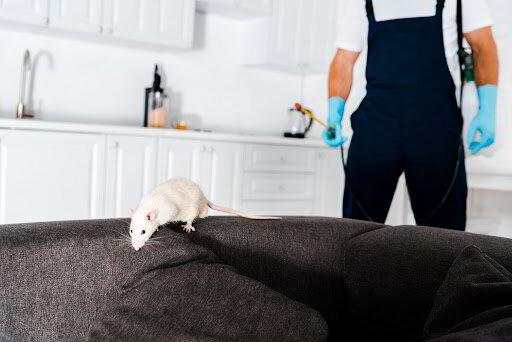
Pests are taking over UK homes and gardens, causing increased stress. Accepting that weather variations are a major factor helps explain this. Environmental changes are fostering ant, mosquito, slug, and woodlice populations by warming winters and wetting summers. This process helps them survive and multiply faster. Due to the changing climate, these pests adapt and infiltrate homes for shelter, food, and warmth. How do you handle this rising issue? Discover the reasons for the bug outbreak and easy ways to reduce their impact.
The Role of Weather in Pest Infestations
Weather changes contribute to pest populations. Many pests thrive in warmer winters and moister summers. Many animals can procreate and thrive longer due to milder temperatures. Warmer temperatures increase ant activity, whereas moist conditions favour slugs and mosquitoes. Pests can survive in the winter and reproduce earlier in the spring due to mild winters. They have a population growth advantage, making pest control harder. Weather fluctuations cause insect activity to skyrocket, so homeowners must be watchful year-round.
Quick Ways to Survive in Pests
Reduce humidity and plug access points to keep pests out. Start by sealing wall cracks, fixing pipes, and ventilating to reduce dampness. To eliminate insect breeding grounds, gutters and drains must be checked regularly. To avoid moisture, routinely check for water damage and insulate your property. Consider dehumidifiers for basements and attics to reduce humidity. Regular maintenance is necessary because even minor leaks or moist areas can attract bugs. so These precautions make bugs less likely to enter, preventing them from doing so
Food Availability: A Key Factor in Pest Invasions
Another reason pests invade homes is food availability. Unsealed bins, crumbs on countertops, and outdoor pet food attract ants and rodents. Fortunately, simple precautions can greatly reduce infestation risk. Please ensure food is stored in sealed containers, clean up spills promptly, and use bins with secure lids. Cover compost heaps and keep them away from your home to avoid pests. Rodents and insects can eat pet food and birdseed left outside for lengthy periods. Clean your food storage places regularly and inspect your cupboard for spilt grains or unsealed packaging that could attract pests. These simple behaviours can make your home less attractive to pests, making it cleaner and safer.
Reducing Pests by Maintaining a Clean Home and Garden
Pests like mice and spiders like to hide in congested rooms or overgrown gardens. Cleaning up storage and trimming plants will greatly reduce pests around your home. Firewood should also be elevated and stored away from the home to deter vermin. Vacuuming corners and under furniture destroys bug nests, making your home less appealing. A tidy outdoor environment is crucial because overgrown plants and dense vegetation near your house can provide cover for insects and small mammals. Maintain outdoor furniture and sheds, which can house pests. Keep your home clean inside and out to eliminate pest sanctuary.
Pests Are Inside Our Homes Due to Urbanisation
Pests are moving into homes as cities grow and construction projects rise. Rats, cockroaches, and squirrels are entering our homes due to fewer green places. Maintain roofing, seal windows, and use door sweeps or mesh vent covers to prevent this. Due to urban development, pests can breed in abandoned buildings and construction sites before moving into surrounding residences. Urbanisation reduces natural habitats, forcing pests to rely on humans for food and shelter. Urban pest treatment must be proactive because this trend is likely to continue. You can prevent them from entering your home and spreading infestations with proper care and knowledge.
A Bigger Issue: Declining Natural Predators
Another reason pests are rising is the reduction of natural predators like birds, hedgehogs, and bats. These crucial species, which regulate pest populations, have declined due to fewer green spaces and pesticide abuse. Plant native bushes, bird feeders, or tiny ponds to attract natural predators and maintain nature’s equilibrium. Furthermore, avoid strong chemicals that damage these helpful animals. You build a more sustainable and balanced ecosystem surrounding your house by encouraging these natural predators. Planting ladybird-attracting plants can reduce aphid numbers. Wildlife support improves the ecology and reduces pesticide use by protecting beneficial species.
Natural Solutions and Professional Help
If bugs have entered your home, numerous simple, natural solutions exist. Silicone caulk, daily wiping, and natural repellents like peppermint oil or vinegar can help with mild infestations. Traps can also solve tiny challenges. However, professional help may be needed if the issue persists. Pest control professionals can safely handle larger infestations. A thorough pest management plan includes professional detection of home vulnerabilities you may have missed. They can also recommend long-term pest prevention methods beyond DIY solutions to keep your house pest-free. If the problem is worse than you thought, hiring a pest control company might save you time, effort, and money.
Conclusion
Weather changes, food availability, and urban growth cause pests to grow. Pest control can be completed by sealing entry points, cleaning, and promoting natural predators. Call Yor-Pest Control, a trusted pest control company in York and the surrounding region, for persistent infestations. Let us keep your house pest-free for year-round peace of mind! With preventive actions and professional help, you can avoid pests and create a healthier and more comfortable home.

